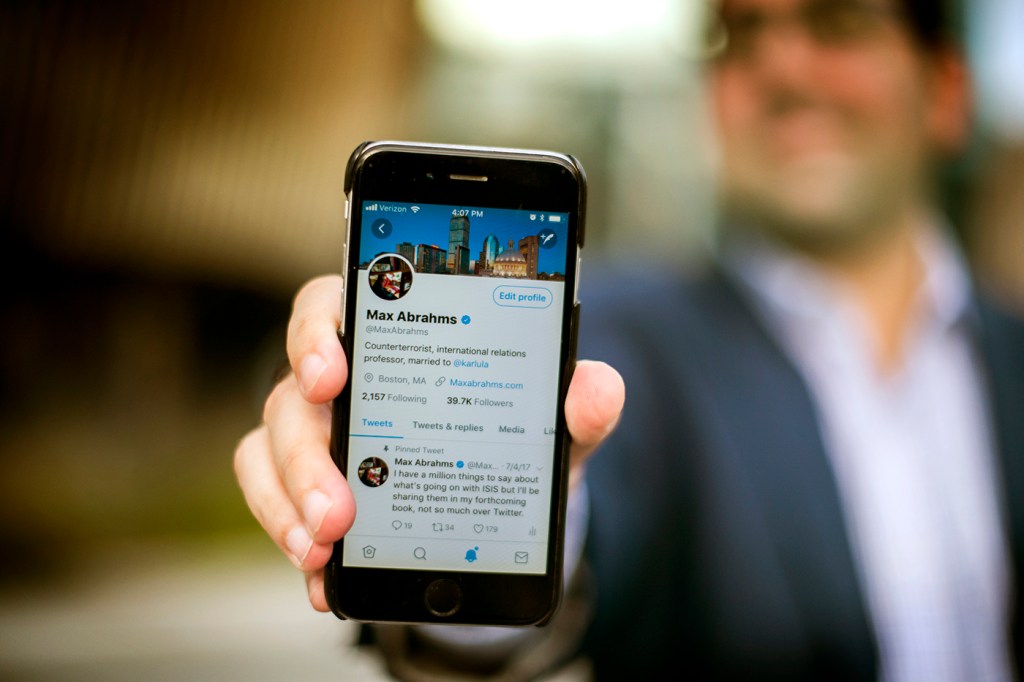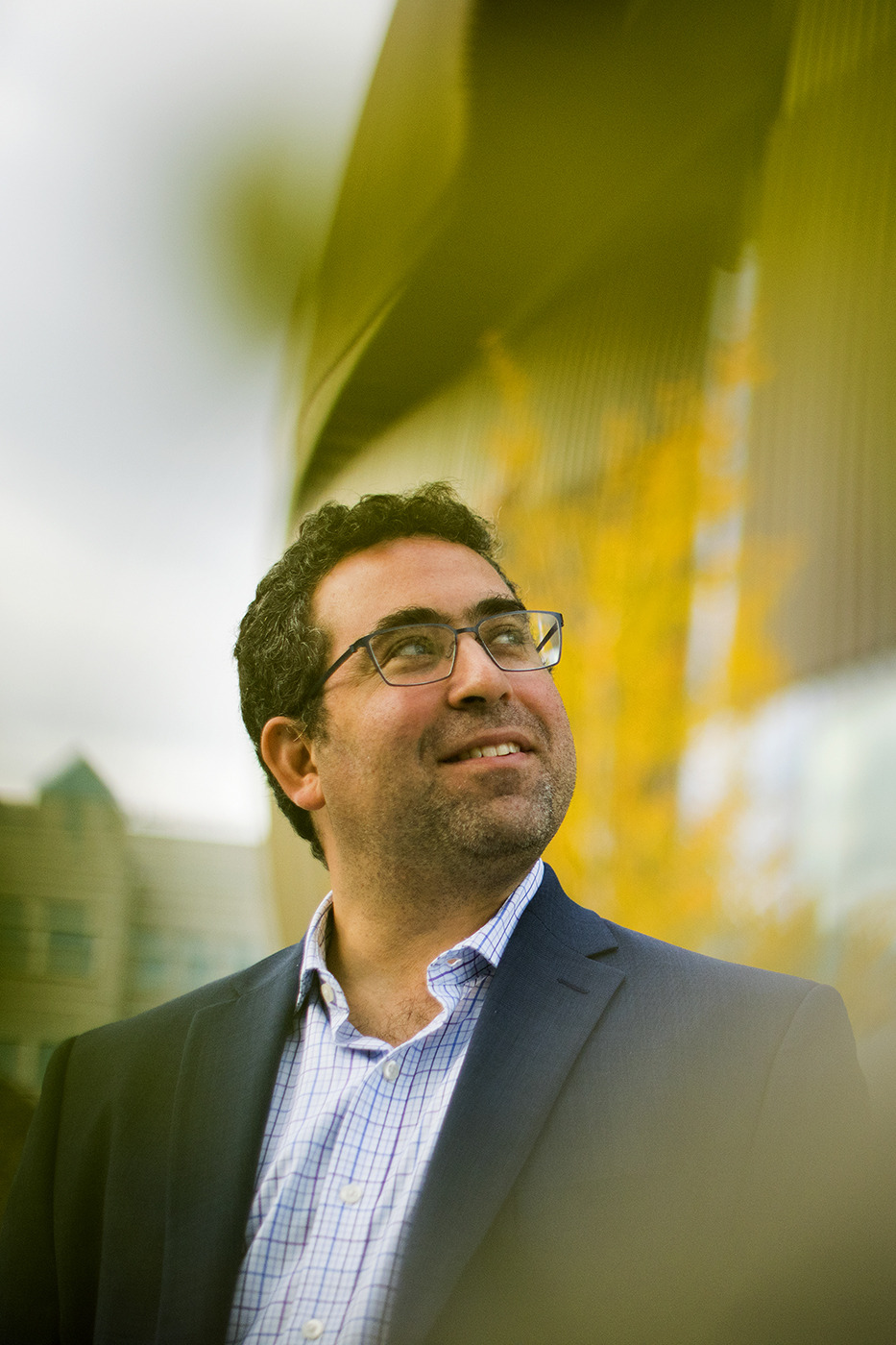Terrorism expert, Twitter fan

For Max Abrahms, Twitter has opened up a whole new world with regard to his research and scholarship. Abrahms, a terrorism expert and professor of political science at Northeastern, has amassed nearly 40,000 followers and is quite active on Twitter. He underscores that Twitter has benefitted him in myriad ways, from networking, to inspiring ideas for the classroom and his research, to opening his eyes to the global community’s varied and nuanced views of terrorism.
“Unfortunately,” Abrahms says, “terrorism is such an enduring problem that there’s a lot of work to do.” Here, he shares how he got started on Twitter, how he approaches his engagement on the social media platform, and why tweeting isn’t for everyone.
How did you get started on Twitter?
I actually joined Twitter in the immediate aftermath of the Boston Marathon bombing [in 2013]. I’d been studying terrorism for a long time, and I wanted to comment on the news. I knew if I joined Twitter that I’d have an instant audience to share my thoughts about the attack.
What advice would you have for other professors?
Many professors use it already, but Twitter isn’t for everybody. There are a lot of people who prefer not to be known, and then even within Twitter there are many different approaches depending on what you want to get out of it. I wouldn’t encourage anyone or every academic to follow my example. It’s very personal how people approach using this social media platform.
You’ve said that Twitter is not for everyone, including some academics. Why is that?
For one, it depends on your personality. I know of a professor in Israel who studies religion. He’s the most knowledgeable person I know on this topic, but he reflexively turns down all media requests. He likes to express himself purely through scholarly outlets. For him, Twitter would make no sense. Another factor is the field of study. In my field, it’s an amazing resource because so many knowledgeable people work on this issue in various capacities who are not in academia. I learn a great deal from following the think-tank pundits, even though I often disagree with them. It’s very interdisciplinary, and very rich.
How has Twitter benefited your teaching and research?
Here’s one recent example: I taught a class in my international security course for undergraduates on the controversial and debated link between immigration and terrorism. When I was creating the course syllabus, I came across a Washington Post article on Twitter on this very topic that described a study in the Journal of Politics. So I read the article and the study, and I ended up assigning both to my students.
Another story: A couple of years ago, I really wanted to go to India and I set out to use Twitter to help get me there. Whenever someone retweeted me, I looked at their handles to see if they had a connection to India. One day, someone who retweeted me was the director of a think tank in India, so I DM’ed him that I’d love to come and give a presentation. It turned out he was hosting a major conference in New Delhi, and he invited me to present my research. When I got back to Boston, he asked me to write a policy paper and said they’d pay me a small amount of money. I said that instead, I’d like an affiliation with the think tank. On occasion, I get invited back to present my terrorism research to different audiences. It’s a good example of how people can customize their usage of Twitter to get out of it what they want.

“Because of Twitter, I have a much greater understanding of the nuances of people’s view on international topics, and that better appreciation impacts my tweets,” says Max Abrahms, professor of political science at Northeastern. Photo by Matthew Modoono/Northeastern University
You have nearly 40,000 followers. What factors have contributed to this?
I do a lot of real media, if you will. When people hear or see me in the news, they’re more likely to follow me on Twitter. I also am a real contrarian. I say things that people wouldn’t necessarily hear from other sources. Certain political ideas I have are relatively unusual. People who like those views see me as a leading exponent of those views. For example, I’ve been a critic of the neo-conservative push to topple the Syrian president. Most analysts in the West have the opposite view. They have been pushing the goal of toppling Syrian President Bashar Assad, so a lot of my tweets over the past few years have been about the risks of doing that.
Has building a large following on Twitter changed your approach?
I learn a great deal from Twitter. I provide content, but I also consume a huge amount of content. Every night before I go to sleep I read through my feed and it’s pretty much restricted to people commenting on politics, especially international relations. Because of Twitter, I have a much greater understanding of the nuances of people’s view on international topics, and that better appreciation impacts my tweets. The more exposed you are to different points of view, the more you understand them and the more reticent you are to say things that could needlessly antagonize various people. Although Twitter can be pretty hard-nosed and callous, it can also make you more sympathetic to other perspectives.
As you say, terrorism can be a hotly debated topic and deals with very sensitive matters. How have you navigated this delicate path on Twitter?
One thing is that I don’t call out people by name. I will refer to them as a think-tank pundit or a regime-change enthusiast. I don’t want to get into a back and forth with somebody about it. I don’t write nasty things about people, and generally they don’t write nasty things about me. I stick to the issues, and I also back up my points with scholarship where possible. There’s often a disconnect between scholarship and policy analysis. I link to studies that back up my points.
You’ve talked about how well Twitter has worked for you. What about it hasn’t worked for you?
Twitter is very good for making short statements and sharing links. A lot of content can be packed into a tweet. That said, Twitter is not good for expressing complex ideas. Many times I’ll want to say something but I can’t figure out how to say it in such little space. I also don’t like to go back and forth with people on Twitter because I feel self-conscious, almost as if we’re having a dialogue that’s being seen by the public. So I’ll message someone privately and ask if they want to have a more substantive conversation over the phone.





